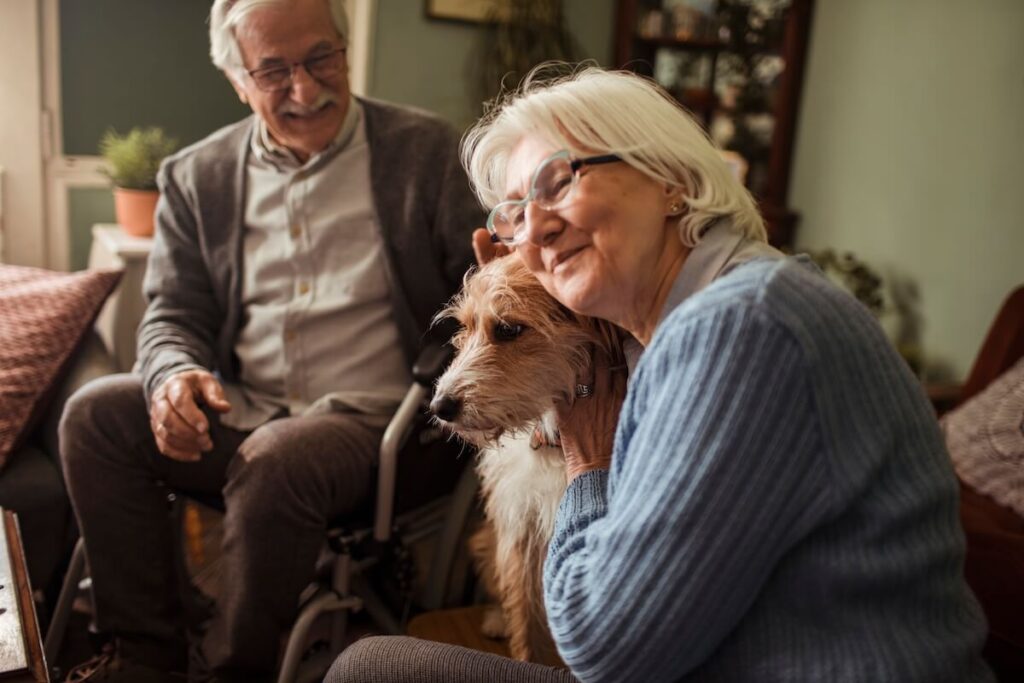Dementia affects millions of older adults each year, affecting not only a person’s memory but also posing challenges to emotional and physical well-being. Finding ways to bring comfort and connection to a family member with dementia is essential, and innovative practices like gentle animal interactions do just that.
The health benefits of animal interactions for those living with dementia are numerous, leading to improvements in cognitive, emotional, and physical well-being. Our memory care team in Arkansas shares how animals can provide comfort, joy, and companionship through carefully designed programs in ways that traditional methods alone may fall short.
The Health Benefits of Animal Interactions in Dementia Care

Reduced Agitation and Anxiety
Many individuals with dementia experience moments of distress due to confusion or overstimulation. A dog’s calming presence or the gentle purring of a cat can soothe uneasiness like few other interventions can.
For instance, therapy dogs often provide a tactile connection that helps slow rapid breathing and creates a sense of calm in a chaotic surrounding. Simply stroking an animal’s fur has been scientifically linked to a lower heart rate, aiding both mental and physical relaxation.
Improved Mood and Emotional State
Animal interactions consistently spark joy and lift the emotional state of older adults living with dementia. Whether connecting with a therapy dog during or holding a soft, comforting rabbit, individuals often show remarkable improvement in mood. This emotional lift stems largely from the release of endorphins—the “feel-good” chemicals that brighten spirits and bring ease.
Imagine your family member, who hasn’t smiled in days, suddenly breaking into laughter during a visit with a playful dog. These moments not only improve quality of life but also encourage deeper engagement with caregivers and others.
Enhanced Social Interaction
Animals serve as natural conversation starters, breaking through the isolation and withdrawal that can accompany dementia. During animal-assisted programs, individuals often feel inspired to reminisce and share stories of past pets or family animals with caregivers and other residents. This social engagement helps foster community bonds and open communication.
A small dog accompanying a therapy session, for example, might remind someone of their childhood pet, unlocking memories and prompting meaningful social exchanges. This kind of dialogue also strengthens relationships within our memory care spaces in Arkansas.
Cognitive Stimulation
Animal interactions provide opportunities for cognitive stimulation through sensory engagement and memory recall. Whether through the soft texture of fur, the sound of playful barking, or the sight of bright-colored feathers on a bird, interacting with animals awakens the senses and stimulates the mind.
For instance, touching a familiar texture or recalling the name of a family pet from childhood can reignite neural activity, encouraging mental engagement and sparking tender moments of familiarity.
Physical Activity and Motor Skills
Spending time with animals encourages gentle movements, whether it’s walking a dog, petting a cat, or grooming a horse. These small actions promote physical activity in a way that feels natural and enjoyable for older adults.
A therapy session might include gently brushing a dog’s coat, an activity that can help improve hand-eye coordination and fine motor skills. Even simple gestures, like holding or stroking an animal, contribute to maintaining mobility and physical engagement.
Sense of Purpose and Companionship
Interacting with animals also fulfills a deeper human need for companionship and purpose. Tending to an animal sparks feelings of accomplishment and connection. Providing care, even in small ways, can significantly counteract feelings of loneliness or insignificance.
A scenario might involve an older adult helping feed a therapy dog during a session. This act brings moments of purpose and pride, creating a powerful bond between the individual and the animal. This companionship often translates into sustained improvements in emotional well-being.
Memory Care in Arkansas: Encouraging Gentle Animal Interactions

At Fox Ridge Luxury Senior Living, we go beyond simply sharing the health benefits of animal interactions—we actively promote and encourage these meaningful connections. One of the standout features of our memory care communities in Arkansas is the Creature Comforts program, a unique initiative that integrates gentle animal interactions into the lives of residents.
Friendly animals like dogs and birds are brought into our memory care communities, offering residents the opportunity to engage in safe, supportive interactions. These encounters are carefully designed to bring joy, reduce stress, and help stimulate cognitive and emotional responses. The program’s ultimate goal is to enhance residents’ overall well-being, creating moments of happiness and connection that have a lasting positive impact on their lifestyle.
Creating Joy and Connection Through Animal Interactions
For families navigating the challenges of dementia, finding meaningful care solutions is paramount. Gentle animal interactions provide a pathway to better experiences, supporting older adults’ cognitive activity, emotional health, and physical well-being.
Our recognized person-centered dementia care programs are designed to provide exceptional support and comfort. Take the first step today by contacting one of our memory care communities in Arkansas. Explore the proven health benefits of animal interactions while experiencing the vibrant culture of Fox Ridge Luxury Senior Living.